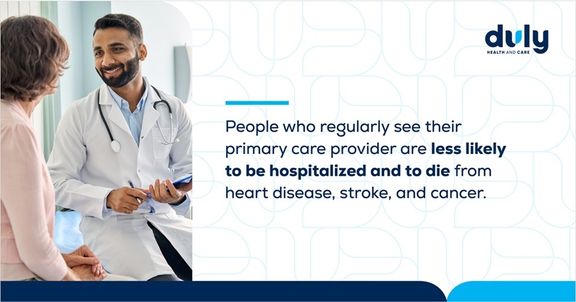You wake up in the morning feeling refreshed. You eat an overall healthy diet, get plenty of exercise, and take care of your mental health. Other than the occasional bug, you feel like you’re the picture of health.
And now you’re wondering – do I really need to see my primary care provider, or PCP, every year?
The answer is yes, absolutely.
The importance of primary care can’t be overstated. PCPs are experts at illness prevention. They can find signs of potentially serious medical conditions that may be lurking under the surface without causing symptoms, helping prevent the condition from getting worse or causing complications.
At a Glance: Why Primary Care Matters
- Prevents serious illness: Detects diabetes, high blood pressure, and cholesterol early.
- Improves long-term health: Reduces risk of heart disease, stroke, and cancer.
- Supports overall wellness: Helps with sleep, stress, nutrition, and mental health.
- Keeps care consistent: Tracks changes, manages screenings, and coordinates referrals.

Here are some of the sneaky problems that a PCP can help you find in early stages and help prevent serious illness – even if you think your health is in tip-top shape.
Also read: Why Do I Need a Primary Care Physician? 7 Reasons to See Yours
Type 2 Diabetes
Type 2 diabetes is when your body doesn’t use insulin correctly, causing persistently high levels of sugar in your blood. Unmanaged diabetes can have serious health effects, from heart disease to blindness to needing a foot amputated.
Diabetes can’t be reversed, but it can be managed – and it’s a lot easier to avoid complications and stop diabetes from getting worse if you catch and treat it early. The only way to get diagnosed and started on treatment is to see your provider.
A Word from Our Doctor
“I want my patients to understand that prevention and timely treatment lead to better health outcomes, fewer complications and a higher quality of life. Addressing health concerns early not only make them easier to manage, but also reduces long term-costs and stress.
I work with each patient to create an individualized care plan, that is practical, achievable and stress free.”- Samindi Gunasekara, MD, Internal Medicine provider with Duly Health and Care in Joliet, IL.
Don’t wait for symptoms to appear. Early detection is your best defense against diabetes and other silent health conditions. Schedule your annual checkup with a Duly Health and Care primary care provider today and get personalized care that fits your lifestyle.
Find Primary Care near you >
Prediabetes
Prediabetes is when your blood sugar levels are higher than normal but not yet high enough to be considered diabetes. If you get diagnosed with prediabetes, you’re in luck. It’s possible to reverse it before it turns into type 2 diabetes. Many people can reverse course by taking steps like cutting back on added sugars or losing weight. It sometimes just takes small changes – even a 7% weight loss can reduce the risk of type 2 diabetes by nearly 60%.
The earlier you start treating prediabetes, the greater your chance of beating it or delaying diabetes. By seeing your PCP and getting blood tests on a regular basis, you may be able to stop diabetes in its tracks.
Also read: What is Pre-Diabetes – And Can You Reverse It?
Sleep Disorders
It’s normal to have a bout of insomnia or feel overtired every once in a while. However, frequent or long-lasting sleep problems could be signs of conditions like sleep apnea (a disorder where your breathing stops and starts while you sleep) or restless legs syndrome. They could also indicate that you need to improve certain sleep habits, such as setting a more consistent bedtime/wake-up schedule or adjusting your sleep environment.
Sleep problems don’t just leave you feeling groggy or make your partner annoyed by the snoring. If left untreated, they can cause serious complications like heart disease, diabetes, and a higher risk of car accidents.
Your PCP can get you set up with a sleep study or refer you to a sleep specialist to see if you have a disorder. Whether you have a sleep disorder or simply have trouble sleeping, they can help you find ways to improve your sleep.
Skin Cancer
That pesky mole you’ve had for ages, or those summer sun spots that keep appearing? They might not be as innocent as they seem. It’s true that most moles are noncancerous, and that your skin can change as you get older or are exposed to sunlight. But there are also times when they’re signs of skin cancer.
Skin cancer is one of the most common cancers, yet it’s also one of the most treatable – but only if you start treatment early on, before it spreads.
When you notice skin changes (especially if a mole changes size, shape, or color), it’s a good idea to get it checked out by a dermatologist. However, your PCP may be able to find a spot that you never noticed or didn’t think looked “bad” enough to warrant a trip to the dermatologist’s office. They might end up being your first line of defense against skin cancer.
At Duly Health and Care, we know that the earlier cancer is found, the more choices patients may have for treatment and the better the potential outcomes.
That’s why our primary care providers now offer access to the Galleri® multi-cancer early detection test. With a single blood draw, the Galleri test screens for a signal shared by more than 50 types of cancer, identifying cancers before you may even experience symptoms.
Book a primary care appointment to request an MCED test
High Blood Pressure
High blood pressure is often called the “silent killer” because it doesn’t cause symptoms. Even though nearly half of US adults have it, many people don’t realize they have high blood pressure until it causes a serious problem like a heart attack, stroke, or heart failure.
Your PCP can help you develop a plan to lower your blood pressure naturally that includes steps such as losing weight, getting more sleep, or quitting smoking. If lifestyle changes don’t work, your blood pressure is very high, or you have other diseases or risk factors, it’s especially important to talk to your PCP. There are very effective medications, but these can only be prescribed by healthcare providers. There are no over-the-counter blood pressure medications.
High Cholesterol
PCPs can also find another silent condition: high cholesterol. High cholesterol is when you have too many fats in your blood, and it is a major risk factor for heart disease. It can significantly increase your risk of dying from heart disease, as well.
Cholesterol medication may make a major difference. Statins (the most popular) can reduce your cholesterol by as much as 50% and may decrease the risk of heart attack by about 25% to 35%. But as with high blood pressure medication, you need to have a healthcare provider prescribe statins – and your provider needs to diagnose high cholesterol in the first place.
What Else Can PCPs Do?
PCPs do much more than diagnose and treat illness. Your PCP can:
- Monitor your health over time, which allows them to notice patterns and catch when something is off
- Give vaccines
- Help you improve overall wellness and healthy living (like providing diet and exercise recommendations or going over methods for preventing the flu)
- Advise you on regular screenings you’re due for, like mammograms and colonoscopies
- Refer you to specialists
- Screen for mental health concerns
The best way to reap the benefits of having a PCP is to see them every year for an annual check-up. Even if every visit finds you healthy as a horse, checking in with your provider yearly gives you the opportunity to build a trusting relationship so that you’re confident and comfortable if you get sick in the future.
Also read: Your Guide to Your Annual Wellness Visit
You deserve a primary care provider who knows you, monitors your health over time, and catches problems before they become serious. Whether it’s managing prediabetes, checking that suspicious mole, or simply ensuring you’re on track with screenings, Duly Health and Care’s primary care team is here to help you stay healthy for life.
Find a primary care physician near you and schedule your yearly physical today.
Find Primary Care near you >
Health Topics:








